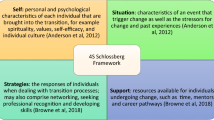Abstract
Objective
Medical schools and departments of psychiatry around the world face challenges in integrating science with clinical teaching. This project was designed to identify attitudes toward the integration of science in clinical teaching and address barriers to collaboration between scientists and clinical teachers.
Methods
The authors explored the interactions of 20 faculty members (10 scientists and 10 clinical teachers) taking part in a 1-year structured faculty development program, based on a partnership model, designed to encourage collaborative interaction between scientists and clinical teachers. Data were collected before, during, and after the program using participant observations, surveys, participant diaries, and focus groups. Qualitative data were analyzed iteratively using the method of meaning condensation, and further informed with descriptive statistics generated from the pre- and postsurveys.
Results
Scientists and clinicians were strikingly unfamiliar with each other’s worldviews, work experiences, professional expectations, and approaches to teaching. The partnership model appeared to influence integration at a social level, and led to the identification of departmental structural barriers that aggravate the divide between scientists and clinical teachers. Issues related to the integration of social scientists in particular emerged.
Conclusion
Creating a formal program to encourage interaction of scientists and clinical teachers provided a forum for identifying some of the barriers associated with the collaboration of scientists and clinical teachers. Our data point to directions for organizational structures and faculty development that support the integration of scientists from a wide range of disciplines with their clinical faculty colleagues.
Similar content being viewed by others
References
Weatherall DJ: Science in the undergraduate curriculum during the 20th century. Med Education 2006; 40: 195–201
Gordon DG: Clinical science and clinical expertise: changing boundaries between art and science in medicine, in Biomedicine Examined. Edited by Lock M, Gordon DG. Boston, Kluwer Academic, 1988, pp 257–295
Woods NN: Science is fundamental: the role of biomedical knowledge in clinical reasoning. Med Education 2007; 41: 1173–1177
AAMC: Contemporary issues in medicine: basic science and clinical research. Washington, DC, Association of American Colleges, 2001
Frecker RC: A Toronto perspective. Clin Invest Med 2000; 23: 12–17
Croen LG, Lief PD, Frishman WH: Integrating basic science and clinical teaching for 3rd-year medical-students. Med Educ 1986; 61: 444–453
Stevenson FT, Bowe CM, Gandour-Edwards R, et al: Paired basic science and clinical problem-based learning faculty teaching side by side: do students evaluate them differently? Med Educ 2005; 39: 194–201
Vogel WH: Relevance of “irrelevant” facts in medical education: the value of basic science teaching for later medical practice. Acad Med 1993; 68(suppl 2): S27–S28
Prince KJ, van Mameren H, Hylkema N, et al: Does problem-based learning lead to deficiencies in basic science knowledge? An empirical case on anatomy. Med Educ 2003; 37: 15–21
Skeff KM, Stratos GA, Bergen MR, et al: A pilot study for faculty development for basic science teachers. Acad Med 1998; 73: 701–704
Crabtree BF, Miller WL: Doing qualitative research, 2nd ed. Thousand Oaks, Calif, Sage Publications, 1999
Kvale S: Interviews: An Introduction to Qualitative Research Interviewing. Thousand Oaks, Calif, Sage Publications, 1996
Gieryn T: Boundary work and the demarcation of science from non-science: strains and interests in professional ideologies of scientists. Am Sociological Rev 1983; 48: 781–795
Bloom S: Structure and ideology in medical education: an analysis of resistance to change. J Health and Soc Behavior 1988; 29: 294–306
Witz A: Professions and Patriarchy. London, Routledge, 1992
Muzzin L: Powder puff brigades: professional caring vs. industry research in the pharmaceutical sciences curriculum, in The Hidden Curriculum in Higher Education. Edited by Margolis E. New York, Routledge, 2001, pp 135–154
Good BJ, Good, MJD: Learning medicine: the construction of medical knowledge at Harvard Medical School, in Knowledge, Power, and Practice: The Anthropology of Medicine and Everyday Life. Edited by Lindebaum S, Lock M. Los Angeles, Calif, University of California, 1993, pp 81–107
Fang D, Meyer RE: PhD faculty in clinical departments of U.S. medical schools, 1981–1999: their widening presence and roles in research. Acad Med 2003; 78: 167–176
Atkinson M, el-Guebaly N: Research productivity among PhD faculty members and affiliates responding to the Canadian Association of Professors of Psychiatry and Canadian Psychiatric Association survey. Can J Psychiatry 1996; 41: 509–512
Author information
Authors and Affiliations
Corresponding author
Additional information
The authors wish to thank Dr. Glenn Regher for his helpful feedback and comments. At the time of submission, the authors disclosed no competing interests.
Rights and permissions
About this article
Cite this article
Martimianakis, M.A.(., Hodges, B.D. & Wasylenki, D. Understanding the Challenges of Integrating Scientists and Clinical Teachers in Psychiatry Education: Findings from an Innovative Faculty Development Program. Acad Psychiatry 33, 241–247 (2009). https://doi.org/10.1176/appi.ap.33.3.241
Received:
Revised:
Accepted:
Published:
Issue Date:
DOI: https://doi.org/10.1176/appi.ap.33.3.241



